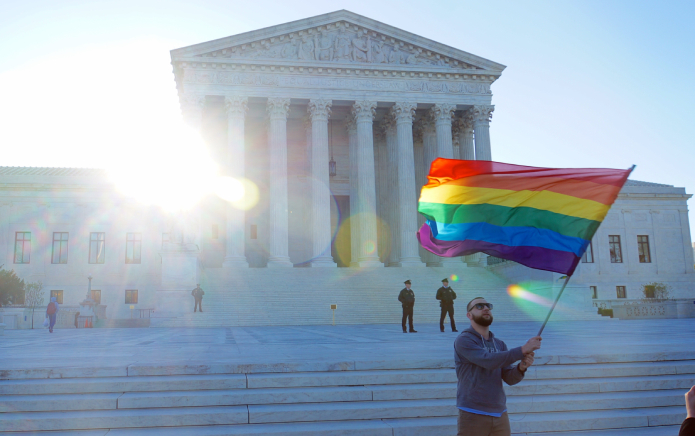The US Supreme Court has set a date on whether it will hear a case challenging same sex marriage.
Back in July, Kim Davis – who made headlines in 2015 for refusing to issue marriage licenses to same-sex couples – filed a petition for writ of certiorari, appealing two past verdicts that ordered her to pay $100,000 to one of the same-sex couples she denied a marriage license to, and $250,000 in attorney fees.
The filing also urged the Court to overturn the landmark Obergefell v. Hodges ruling, calling it “grounded entirely on the legal fiction of substantive due process.” Davis further claimed that the 2015 decision forced her to choose “between her religious beliefs and her job.”
On 23 October, the Court announced that it had set a date to consider whether to hear the challenge.
According to SCOTUSblog, the nine justices will be meeting in a private conference on 7 November.
The blog went on to reveal that the Court usually grants reviews after two consecutive conferences. The upcoming hearing will be the first for Davis’ case. If the Court denies a review following their meeting on 7 November, an announcement can be released as soon as 10 November.
The recent update comes a week after conservative Supreme Court Justice Amy Coney Barrett – who was appointed to the high court during Trump’s first term– addressed the possibility of Obergefell v. Hodges being overturned.
During a recent conversation with The New York Times‘s Ross Douthat, Barrett said marriage equality has “very concrete reliance interests,” making it unlikely to be taken away.
Ted Eytan on Flickr
She went on to define “reliance interests” as “things that would be upset or undone if a decision is undone.”
Elsewhere in the interview, Douthat inquired if there can be “social reliance interests in the sense of people making life choices on the basis of a right being protected.”
He added: “One of the arguments for why Obergefell v Hodges is unlikely to ever be overturned is the idea that people have made decisions about who to marry and therefore where to live and children… Everything else, on the basis of that ruling.”
In response, Barrett described Douthat’s example as “absolutely reliance interests,” stating that she wouldn’t classify them as “social reliance interests.”
“That kind of sounds like in things in the air. Those are very concrete reliance interests. So those would be classic reliance interests in the terms of the law, in terms of legal doctrine… Those are financial. Those are medical,” she explained.
Another conservative Supreme Court Justice who shared a similar opinion is Samuel Alito. While speaking at an academic conference on 3 October, he said that marriage equality is “entitled to respect,” despite his dislike of the Obergefell v. Hodges ruling.
For information about the status of marriage equality in the US, click here.
